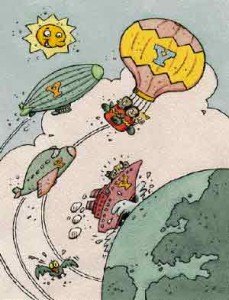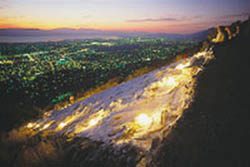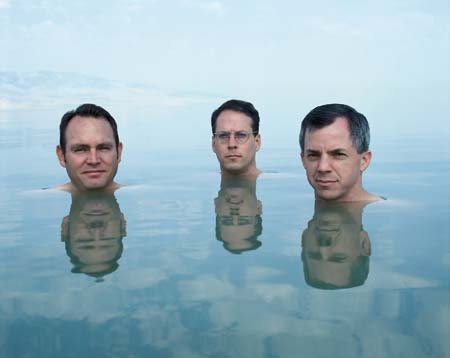By Hal B. Gregersen and J. Stewart Black
 Robert D. Lewis sees his work as “equal parts fascination and frustration,” he says. As a lawyer working in a telecommunications company, he generally finds that the fascination outweighs the frustration. And so he is staying–in China. * For Robert and many other BYU alumni like him, the world is expanding. A century ago, the practical world for most people in the United States included their hometown and state, or possibly a region of the country. But for their posterity the world can easily encompass the entire planet. Indeed, advancing technology continues to give BYU alumni increasing access to the rest of the world. And with that access come more opportunities to serve and learn among people whose backgrounds, values, and perspectives differ from their own.
Robert D. Lewis sees his work as “equal parts fascination and frustration,” he says. As a lawyer working in a telecommunications company, he generally finds that the fascination outweighs the frustration. And so he is staying–in China. * For Robert and many other BYU alumni like him, the world is expanding. A century ago, the practical world for most people in the United States included their hometown and state, or possibly a region of the country. But for their posterity the world can easily encompass the entire planet. Indeed, advancing technology continues to give BYU alumni increasing access to the rest of the world. And with that access come more opportunities to serve and learn among people whose backgrounds, values, and perspectives differ from their own.
The World Is Getting Larger
In a recent presentation on the implications of globalization, we asserted that the world is getting larger, not smaller. One listener pointed out that crossing the Atlantic took two weeks by steamer 100 years ago but takes less than four hours by Concorde today. “Surely, high speed data transmission and supersonic travel bring countries like the United States and the United Kingdom closer together,” the person insisted. “Isn’t the world really smaller?” * Our answer is a resounding “No.” Technological advances may seem to make the world smaller, but they really make it larger. * To understand why, think of people as mapmakers–mental cartographers. Just as cartographers map the physical terrain, so do people create mental maps of the world around them. If we don’t know much about a place or thing, we give it little mental space. * Until recently, the rest of the world has been far, far away–both physically and mentally. In the past it took so long and was so difficult to travel to far away places that most people stayed right at home. And in the past we didn’t hear about foreign lands and people. As a result, our personal mental maps of the overall world were quite small.
In the not too distant past, for example, we didn’t have to think about the Russian ruble. Most Americans didn’t even know the name of the Russian currency. But in 1998, the ruble depreciated by 50 percent, then the U.S. stock market dropped by 15 percent, and over a trillion dollars of market value evaporated in a week. Also, 15 years ago we didn’t worry about the stability of the Indonesian government and how it might affect oil prices. Today, we do care about these things.
The apparent “shrinking of the globe” by technology has made it possible–even necessary–for each of us to comprehend more of our planet. As the world has become figuratively smaller, our world–your world, the world for each individual–has become practically larger. We are forced to think about places that never took up any mental space, to worry about events that never occupied our minds. Today if you could pop open people’s heads and examine the mental maps they carry, we think you would find their maps of the world getting much larger–especially if you look across generations. Just 10 years ago, for example, how many children used the Internet to learn about people and places dotting the globe? Not one. Today they race around the world on lightning-speed data lines that make their world exponentially larger than ours was at their age.
Whether we like it or not, the globalization tsunami, an enormous ocean wave, is inescapable. In business, it is impossible to survive today and not scan the entire world for competitors, suppliers, customers, and human resources. In medicine, it is folly to focus only on the advances within one’s national borders. In art, it is shameful to miss the beauty found at far corners of the world. In engineering, it would be foolhardy to ignore what our foreign counterparts learn about seismic motion.
Opportunities to Serve
As our minds grow to encompass more of the world, so too do our opportunities to serve, professionally and personally. Today we have the good fortune to serve people in places that simply didn’t exist on our mental maps of the past. And BYU alumni are taking advantage of those opportunities.
After experiences that took her literally around the world, Joan Dixon, ’76, MOB ’83, landed in Jakarta, Indonesia, to use her skills at the Directorate of Community Education. As a freshman at BYU, Joan says, she was “lost in a world of art and literature where politics was simply boring.” Going on a mission for the Church changed all that. In Thailand she served in refugee camps, helping people whose lives had been destroyed by the Vietnam War. Her political awareness increased substantially.
After returning home and completing a master’s degree at BYU, Joan focused her life on helping refugees through literacy and employment programs. Experiences in Nigeria and Gambia solidified her commitment to a career in literacy education.
Now in Indonesia, Joan says, “I am always happiest when I’m actually meeting the people.” During her first six months in the country, she moved 48 times between 27 locations, spending time at one training center after another. She survived this nomadic life with a portable computer and printer in one suitcase and her “house” packed in another.
While Indonesia is the fourth most populated country in the world, around 10 percent of the population is illiterate. Joan tries to merge income-generating programs with literacy education. In Jakarta she noticed a strong informal economy based on selling snacks to friends and neighbors. So now her literacy groups write recipes, do math for the recipes, sell the snacks, and do bookkeeping. This approach helps people achieve functional literacy by reading and writing in everyday life.
In Indonesia, Joan is usually “on a literacy mission with Muslim companions,” she says. And she has learned a lot about fasting and praying from Muslims. “Two years ago, I was in the field for the entire fasting month, so I fasted with them,” she says. “It gave me the opportunity to examine my own spiritual practices.”
Today Joan sees herself serving as “a citizen of the world, as opposed to a specific country, and as a member of a global church, transcending national boundaries.”
 For Robert K. Neilson, ’72 (Margaret Preator, ’69), working in Korea has been similarly enriching. Bob lives in Seoul as partner-in-charge of the PricewaterhouseCoopers financial advisory services business and as the managing partner for Asia-Pacific mergers and acquisitions. In this job, he has come to “appreciate differences in thinking and problem solving and to understand that Western ways of doing business are ineffective in many Asian contexts.”
For Robert K. Neilson, ’72 (Margaret Preator, ’69), working in Korea has been similarly enriching. Bob lives in Seoul as partner-in-charge of the PricewaterhouseCoopers financial advisory services business and as the managing partner for Asia-Pacific mergers and acquisitions. In this job, he has come to “appreciate differences in thinking and problem solving and to understand that Western ways of doing business are ineffective in many Asian contexts.”
The recent Korean financial crisis has created an acute need for help from experts. Bob and his consulting teams have successfully trained and mentored many Koreans in the sophisticated financial analysis required to help them move beyond the crisis. His service through sharing professional knowledge is helping South Korea regain its competitive strength. At the same time, Bob’s work has provided numerous chances to share his personal beliefs with Korean business people.
Finally, look at the experiences of Steven M. Stewart, ’95, in Finland. He served a mission in Finland and later returned to work as an editor and writer for Nokia, a telecommunications company. “Being an American in a foreign company brings a different perspective to their decisions,” he says. And his bilingual talents have proven invaluable when making presentations and helping Nokia gain greater international market presence.
While in Finland, Steven has also tried to make a difference through church service. Involvement in the Helsinki Stake’s young adult programs not only strengthened his testimony but also gave him the chance to meet and fall in love with his Finnish wife, Silja Happonen.
Along with service at work, at church, and in the community, Steven and Silja relish most the opportunity to raise their family and, they say, to “pass on the best of both worlds, Finland and America,” to their children.
Opportunities to Learn
As BYU alumni go forth to serve around the world, they also end up learning–quite a lot. In fact, professional service in other countries provides the perfect environment for learning and growth.
Gary K. Griffiths, ’81, and his family, for instance, learned a lot when they moved to Poland for several years. Gary was the finance director for the Salt Lake Marriott hotel when he was asked to serve in the same position for his company’s first hotel in Poland–the Warsaw Marriott. Experience had given him the financial skills to handle the new venture, but few things had prepared him to redraw his mental maps as much as he did in Warsaw.
One of Gary’s first challenges was finding a telephone for his family. After contacting the “right” people in the telephone company, pulling some “pretty impressive strings,” paying $600 (an enormous sum at that time in Poland) to extend a line into his subdivision, and waiting six months, the family finally got a phone. The Griffiths were amazed at how long it took, but their neighbors were dazzled by the lightning speed. They had been waiting more than 20 years for phones.
During the hotel startup, Gary’s management team in Warsaw faced many surprises. For example, since the state banks were “too full” to open more business accounts, Gary opened the hotel’s account in his own name. When the first wire transfer of $200,000 from the United States was “lost” (and didn’t surface for six months), he was forced to travel to Austria and carry $25,000 cash across the border into Poland.
On the first day of business, the hotel served 2,200 meals. Poland worked on a cash basis at that time, and given the zloti currency exchange rate, Gary had an unexpected problem the next morning. His night clerk called to ask, “How should we get the cash to the bank?” Gary responded with the standard procedure: “Put it in a deposit bag and take it to the bank.” The clerk told Gary he probably ought to come down to the cashier’s office. He did–and was stunned. The room was literally full of zloti bills that lined the walls from floor to ceiling. Gary had the engineering department build a trunk, complete with two large padlocks, to replace the standard cash bag. Day after day, week after week, he sent the clerk with four very large men to deliver the trunk full of cash to the bank.
After the constant uncertainty of living and working in Warsaw, Gary concludes, “I had to improvise more than ever before. I had to change my fundamental paradigm of how to do business.
These frames of reference are educated into us, but when going overseas, those frames usually become massive blinders.” Despite the challenges, he praises his experience: “I found tremendous satisfaction in bringing jobs to the country and supporting a budding democracy.”
Like Gary, Merrill R. Landers, ’93 (Teresa Weaver, ’94), learned more than he expected while working overseas. In 1996 while completing his doctorate in physical therapy, he worked as an intern for a large rural hospital in Eksjo, Sweden. There he interacted extensively with top Swedish clinicians and researchers. He also worked directly with the only PhD physical therapist in Sweden, conducting research, coauthoring articles, and even assisting in orthopedic surgeries.
After returning home, Merrill realized that in Sweden he had learned to pay more attention to details in his practice, and he had gained superior critical thinking skills. In retrospect, he explains, “I learned more from my experience in Sweden than from many of my counterparts in the United States.” He also gained a broader perspective on the practice of physical therapy, which has helped him serve a very diverse patient clientele in the United States
Our opening story of Robert Lewis, ’82, JD ’85 (Julia Tenney, ’81), provides a prime example of alumni learning overseas. As a lawyer working in Beijing for Nortel, a telecommunications company based in Canada, Robert builds on language and cultural skills acquired during his mission in Taiwan. Blending the expectations of Western business and legal culture with Chinese practice has been, he says, a “continuing learning experience.”
In China, he explains, “Legal deals are more interesting and complex than back home. But with this excitement comes the responsibility to weigh and reconcile often incompatible objectives, where the risks almost always seem to outweigh the potential rewards. It’s very stressful. But on balance, the fascination outweighs the frustration.”
Robert’s fascination with China has also produced enduring friendships. He sees many Chinese colleagues as heroes because of “their tremendous inner strength that came from living through incredible hardships during the past few decades.”
At home, Robert and his wife, Julia, observe enormous family benefits from living overseas. They explain that their children “understand that there is more to life than American popular culture. Their international school education helps them focus on elements shared by all cultures.”
Robert and Julia feel that “family life is more inwardly focused here since we depend more on each other and there are fewer distractions. School, Church, and extracurricular activities are more concentrated and less abundant, so our family’s activities seem less fragmented. Living in a smaller Church branch has given our children more opportuni- ties to serve in branch callings. Our family benefits from this emphasis on the meat of the gospel rather than the sometimes sizzle of activities in our wards back home.”
“Go Ye into All the World”
The globalization tsunami is inescapable. We will all get wet, whether we like it or not. This means our mental maps of the world must expand. Opportunities for BYU alumni to impact the world are on the rise. As people understand cross-cultural adjustment and other dynamics associated with going overseas, they can serve and learn successfully in other parts of the world. In fact, international assignments hold unique potential for changing our mental maps, expanding our vision, and broadening our perspective. This creates a virtuous cycle because as our minds enlarge with further light and knowledge, so do our capabilities for understanding, embracing, and serving others.
Perhaps most important, as alumni traverse the world with assignments taking them from country to country, they help bring to pass the final words of Christ to his disciples in Jerusalem, “Go ye into all the world” (Mark 16:15). His directive becomes particularly powerful in our day if we recall that his disciples’ world was relatively small. In comparison, our world is vast. As BYU alumni continue to go forth and fill the ends of the earth, giving and receiving along the way, we will help fulfill Christ’s words in these latter days.









